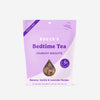
During a time of the year where it seems no one is immune to being stuck at home coughing and sneezing, it’s natural to wonder if the same happens to our pets - and if what we have can be passed on to them. In humans, the most common causes of the cold are rhinoviruses, which luckily cannot be passed to our pets. However, they are susceptible to other infections that look similar to the colds we get.
What Causes Colds in Pets?
In dogs, common causes of cold and flu-like illnesses include Kennel Cough, canine parainfluenza virus, and canine adenovirus. The cold-like infections that cats get are mostly viral, primarily from the feline herpesvirus and feline calicivirus.
These infectious diseases are incredibly contagious between animals of the same species. Outbreaks often happen in daycare, grooming, and boarding facilities where animals are kept close together. Infections like the feline herpesvirus can be acquired at one time but stay dormant until another event triggers it.
Prevention Tips
Staying healthy starts with having a robust immune system. Mushroom supplements like Super Snouts’ Super Shrooms help aid the body’s natural resistance to pathogens. Even with a supported immune system, stressful situations like boarding and grooming can make a pet more susceptible to infections, or can activate a dormant infection. Offering supplements that support emotional balance like Super Snouts Hemp Company’s Plain + Jane Chews can help keep your pet healthy through stressful times.
It’s also a good idea to only use daycare, grooming, and boarding facilities that stay up to date on your pet’s vaccination records. If they don’t ask you to provide updated records when a vaccination lapses, you can bet you’re not the only one.
What to Do if Symptoms Appear
It’s always recommended to check with your vet if you’re worried about your pet’s symptoms. If your pet seems extra sluggish, has a fever, doesn’t have an appetite, or has green-yellow discharge from their nose - and especially if they’re having trouble breathing - the illness may have progressed to pneumonia and could be an emergency.
Mild cases will often resolve within a week or two with supportive at-home care. Providing your pet with lots of rest and making sure they are well hydrated is essential, just like with people. If your pet doesn’t typically drink much water on their own, even when they’re healthy, feeding or supplementing with a moisture-rich fresh food like My Perfect Pet is an easy way to ensure they are staying hydrated.



